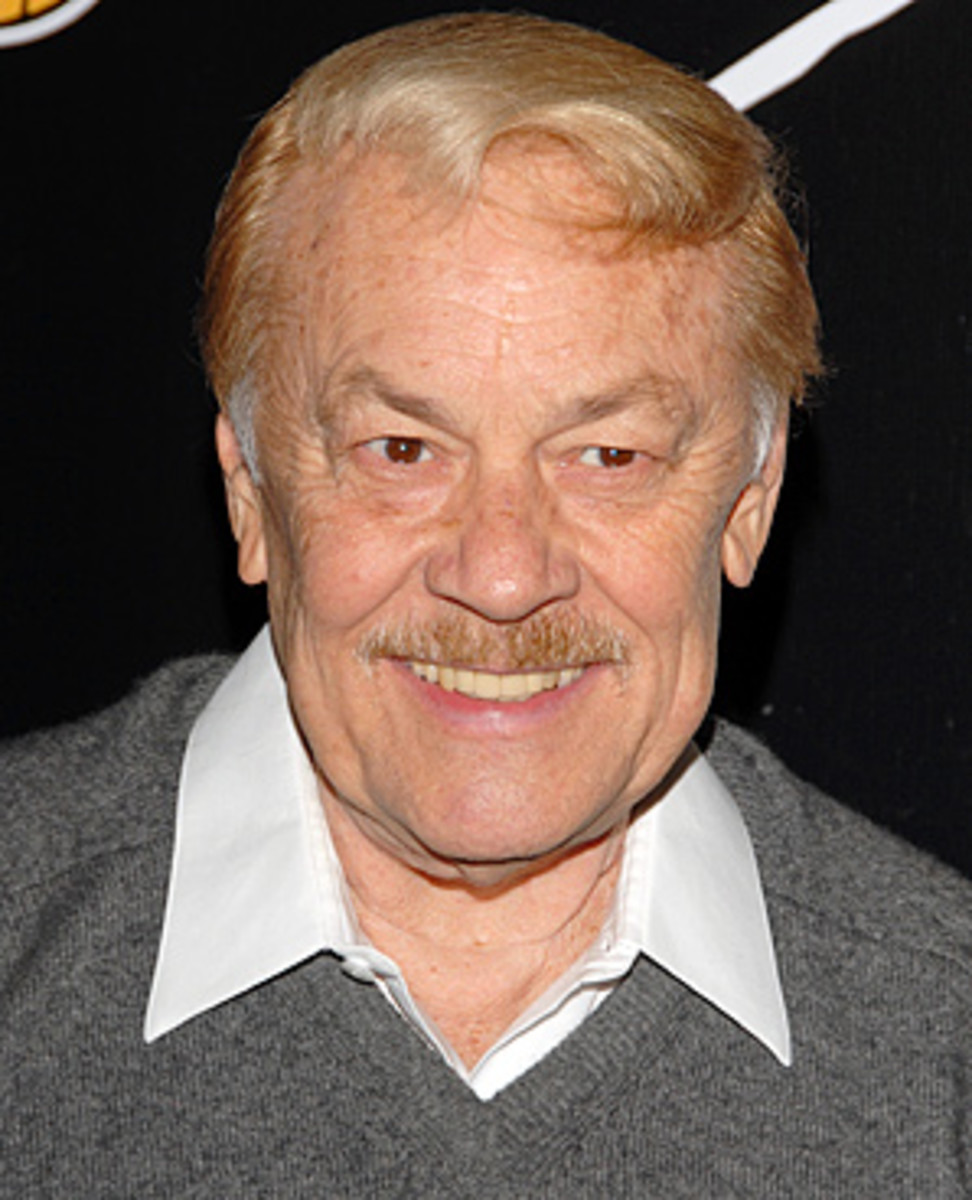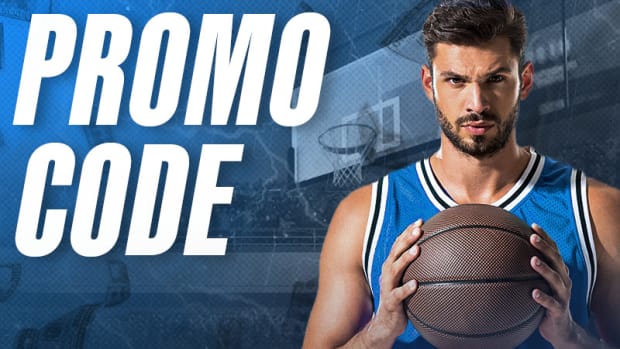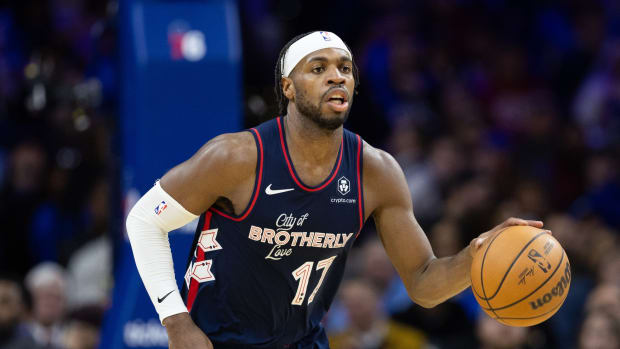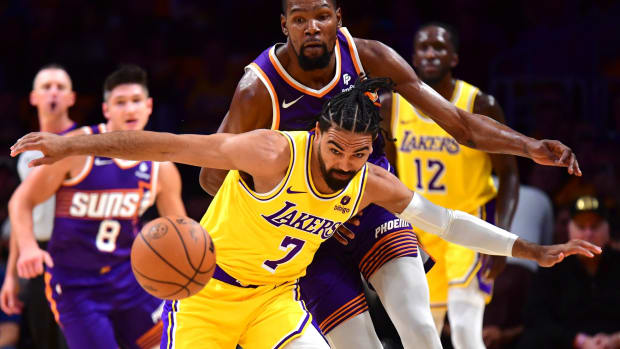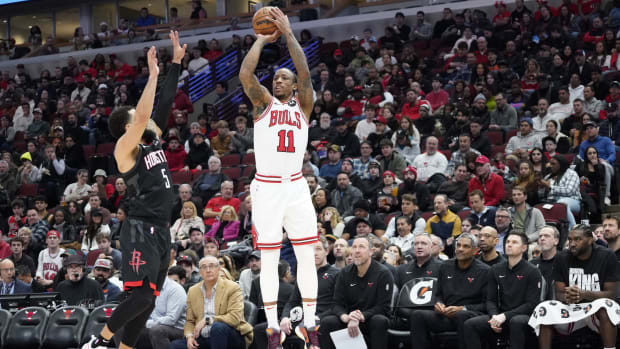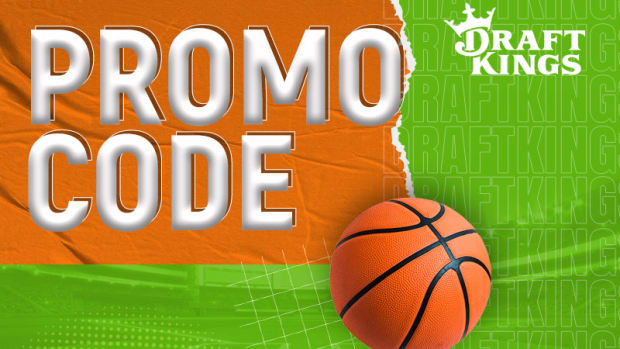Buss' impact on NBA, Rose's return, more topics
Jerry Buss was the most important owner in the modern era of professional sports.
This is not said casually. No owner of his era has played a more important role than the Lakers' Buss, who died Monday at 80. He came along as free agency and escalating TV money were turning traditional mom-and-pop leagues into entertainment industries. Buss' leadership of the Lakers set standards that exist to this day, and he did so in two bookending ways. He defined the standards for the modern star, by way of Magic Johnson, Shaquille O'Neal and Kobe Bryant. He recognized the need for stars and he understood how to promote them while encouraging their individuality.
[JENKINS: Lakers' success a testament to Buss]
His enabling of stars could have ruined pro sports if not for the fact that Buss demanded that his stars be held accountable for the team's results. He expected Magic, Shaq and Kobe to lead the Lakers to championships. He married individuality and teamwork in a way that has been mimicked by football, baseball, soccer and other leagues around the world. In relative terms, Buss set these standards to create more profit, more popularity and more championships than any owner of his time.
It is not going to be easy for his family to uphold that dual standard. It requires a kind of ruthless wisdom that Jim Buss, who has been running the Lakers' basketball operations recently, has not had enough time to fulfill.
[Photo Gallery:Jerry Buss through the years]
All of the major leagues were in transition when Jerry Buss bought the Lakers in 1979, and more than any other owner he helped to lay down the standards that enabled sports to become mainstream entertainment. A long time may pass before another opportunity to redefine the business emerges, and when it does, will the business of sports be fortunate to have its own incarnation of Jerry Buss?
*****
Now, let's go to your questions:
Do you believe Vikings runner back Adrian Peterson's miraculous recovery from a torn ACL has created unreasonable expectations for Derrick Rose? He injured his knee aboutnine months ago and said a week ago that he is still "far away" from returning. Peterson was not only back on the field nine months after his injury, but he was also playing at an MVP level. -- Ted D., Chicago
Yes, Ted, it has created an expectation that is beyond reason. The good thing about Rose's recovery is that Bulls owner Jerry Reinsdorf has insisted that he is going to make sure Rose isn't rushing back prematurely. I can understand wanting to give players target dates and goals to shoot for, but every surgery is different. Coaches talk about how players may be recovered physically from a major injury but still need months to regain their confidence and nerve to play all-out without fear. Peterson has shown what is possible -- but not what is probable or, in most cases, realistic.
I enjoyed your All-Dirk Nowitzki team. Do you ever see the NBA actually employing a U.S. vs. World format for all of the All-Star Weekend events? It might make the three-point or dunk contest more interesting. The East v. West format they tried this year didn't do it for me. -- Emily Schwartz, Dallas
We won't see it for a long time yet, Emily. The rest of the world is going to have to produce more stars to make it worthwhile. Someday that's going to happen, in which case the All-Star game would have more meaning than it carried last weekend. Maybe someday the Americans will be playing in defense of a larger cause, as opposed to the way they played Sunday when the East and West invited each other to sneak backdoor for dunks.
[GOLLIVER: Highs and lows of All-Star Weekend]
Do you have a favorite Michael Jordan memory? -- Carl, Kansas City
It's always going to be the day he scored a playoff-record 63 points in the original Boston Garden against the Celtics. I've never seen anybody rise off the floor so quickly or for so long. I was very lucky to be there for that game.
[50 reasons we'll never forget Michael Jordan | SI's best MJ photos]
David Stern said there is an "unlimited number" of players capable of playing in the NBA. I know Stern is on his way out as commissioner, but do you see the NBA expanding any time in the near future? I know the league always has an eye on growing the game globally. -- Jamie T., Philadelphia
I don't envision the NBA expanding domestically, Jamie. If the league is going to grow more teams, it's going to happen internationally. But the poor state of the economy in Europe, where basketball players are earning far less than they did a few years ago, makes it unlikely that TV networks, sponsors and fans in other countries will be willing to pay the high prices that are required to fund NBA teams here in North America.
I agree with Stern that there is an ever-growing number of players who can play in the NBA. But there are very few stars who are capable of selling tickets. Before the league thinks about expanding overseas, it has to ensure that the new teams have access to stars who will create local interest. There can be no success without stars.
Bernard King is a finalist for the Hall of Fame again. Is this the year he finally gets in? It's a crime that a scorer of his caliber has been left out this long. -- Mike Ray, Tampa, Fla.
I doubt whether King will be inducted, Mike. Was he a tremendous scorer? Absolutely. But did he separate himself from his peers while he played? He had four exceptional years in which he made both the All-Star and All-NBA teams. He didn't qualify for another All-Star Game apart from those four, and his teams won a total of two playoff series. The torn ACL he suffered when he was 28 is entirely to blame for cutting short his Hall of Fame résumé. Had he undergone that surgery today, he could have starred deep into his 30s; in his day, however, it was a potentially career-ending injury from which he was able nonetheless to make an inspiring comeback, though not quite to the same level he had shown before he was hurt.
As I read all the articles about LeBron James "doing things no NBA player has ever done before," I get a sinking feeling in my stomach reminiscent of when Mark McGwire, Sammy Sosa and Barry Bonds were setting baseball "records." In an era when every single other major sport has seen the influx of PEDs (including HGH), why is it the NBA turns a deaf ear to the subject and the reporters whocover the league ignore the fact the basketball floors are graced with "freaks of nature" on a nightly basis? It's naive, ignorant, stubborn and a shame for the players who actually do play by the rules. -- Marc, Medina, Ohio
Performance-enhancing drugs are a third-rail topic for leagues, Marc. When a league is forced to deal with PEDs, the ensuing scandals make everyone look bad -- the players, the teams and the league itself.
The leagues should aggressively confront the PED issue because it's toxic in the truest sense. It ruins the health of those who take drugs and it also ruins the integrity of the competition for those who play by the rules.
At the same time, the leagues that investigate PED usage never receive credit for trying to do the right thing. Instead of being lauded for seeking to clean up their sport, the administrators of track and field, cycling and baseball have presided over eras that have brought the worst kind of incessant publicity down upon them.
I'm not saying I feel bad for these leagues. I am saying that I understand why they would prefer to pretend they have no problem, because once you open the window there is no easy way to get rid of the stench. It ruins everything.
As I mentioned last week, I don't see any reason why NBA players wouldn't be vulnerable to the same ambitions -- to improve production, earn more money and become bigger stars -- that have driven players of rival leagues to take illegal drugs. There is nothing unique or special about the NBA that would prevent players from avoiding the addiction to performance that has overwhelmed stars in other sports.
Stern says his league plans to begin blood testing for human growth hormone (HGH) next season.
"Our players have been front and center with us on this one," Stern said. "They want to be, and be perceived as playing in, a drug-free sport. We have six unannounced tests a year. Two of those are authorized out of season. And we have an independent group of experts that adds drugs to the list of prescribed drugs, and we test in a way that the samples get sent to an approved lab.''
The NBA set new standards for drug testing in 1983 after too many players were scandalized by cocaine and marijuana. But those tests were focused on recreational drugs as opposed to the performance-enhancers that undermine sports today.
No player should be accused of illegal activity unless there is evidence. At the same time, the NBA should be sensitive to the fact that fans have been conditioned to be skeptical of superhuman performances. There is no easy answer to this problem. There is only the right answer, which is to investigate it fully and to rid the league of it, to whatever extent it exists, and sooner rather than later. The longer it goes on, the worse the outcome will be for everybody when the truth comes out. And it will come out inevitably, whether by outside investigation, by tell-all books and documentaries or by the health consequences as experienced by the players themselves.






























